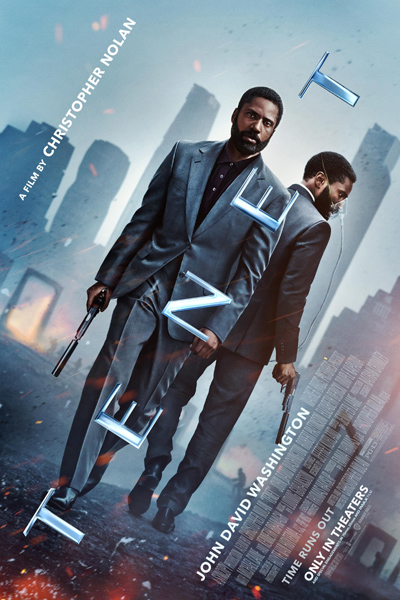Del and Mladen review ‘Tenet’

Image courtesy of Warner Bros.
“Tenet” Starring John David Washington, Robert Pattinson, Elizabeth Debicki, Aaron Taylor-Johnson, Kenneth Branagh, and others. Directed by Christopher Nolan. 150 minutes. PG-13. Pay-per-view on YouTube, Google Play, Amazon Prime, Vudu, DVD.
Del’s take
In my dodderage I’ve become less enamored of puzzle boxes, Russian dolls, hidden meanings, subtext within subtext, Rubik’s cubes and other gimmicks, tricks, deflections and distractions – anything capable of making me believe something that isn’t true. We live in an age Qanon, ignorance on an industrial scale, conspiracy theories, corporate subterfuge and red hat-wearing politicians who not only lie shamelessly but revel in their malevolent deceit. Is it asking too much of a movie to just be a freaking movie and entertain me for a couple of hours instead of making me do a bunch of work?
I spent $15.99 on the “Tenet” DVD and I really, really wish I could get that money back. “Tenet” is well made and several of the performances are excellent, but it’s unwatchably dense and about as warm as a guest at the county morgue.
I can’t effectively summarize the plot because I’m still not sure I understand it. John David Washington is a CIA agent who, after an attack at a Russian opera performance, is recruited into an effort called “Tenet.” (Did I mention none of the characters have names?) Tenet is a war between us and the future. We have doomed the future with climate change, and the future is not happy about it. Future scientists have invented a way to “invert” the entropy of people and objects, allowing them to travel backward in time. Instead of using this inversion nonsense to head off climate change, the future would track down a cache of plutonium pilfered from a Russian ICBM … for what purpose? We don’t know. Is plutonium what they’re really looking for? We don’t know. What’s this about “The Algorithm” – has Facebook also pissed off the future, or is The Algorithm some kind of world-ending secret weapon invented by a future scientist and hidden in the past? Well, we don’t know, but since they bring it up. …
It’s a migraine-inducing onion of riddles hidden within paradoxes layered with feints and false flags, and to be honest I found it exhausting and unrewarding.
What’s good about “Tenet” is the cinematography, the locations, costumes, and some of the performances. Washington is excellent as the CIA agent and in my book would make a fine replacement for Daniel Craig when all those catalogs for Medicare start showing up in his mailbox. Also excellent were Robert Pattinson as Washington’s sort-of partner and Elizabeth Debicki as the suffering wife of a wicked Russian oligarch who may or may not be trying to acquire The Algorithm for his own demented death-bed purpose.
What I did NOT like about “Tenet” was the blink-your-eyes-and-miss-critical-plot-points narrative, the mumbled and often indecipherable dialogue, the lack of any pathos (which is typical of Christopher Nolan’s fare) and the unfathomable density of the plot. It seems Nolan is making movies for himself, not his audience.
After everything that has happened the past four years, my brain is only capable of processing movies like “Hobo with a Shotgun” or “The Man Who Killed Hitler and then the Bigfoot.” I would need a few less pandemics, insurrections and climate catastrophes before I could enjoy “Tenet.”
If acting and cinematography were the only criteria I could give “Tenet” an A-. But its hard-to-hear dialogue, lack of an emotional heart and black-hole density bring that grade down to a B. If you’re up for doing the work Nolan seems to ask of his fans, knock yourself out. I wasn’t.

Mladen’s take
Alas, I share Del’s frustration with “Tenet.” Despite his dodderage and, believe me, it’s advanced, he’s correct about the film. “Tenet” is a mess in execution.
Actually, I’m more frustrated than Del because I disliked the suffering wife/doting mother character played by Elizabeth Debicki. She damn near caused the destruction of 7 billion people in our time because she didn’t want her one son to be traumatized by, oh, hell, I forgot the reason.
“Tenet” is based on a neat concept. In this nicely shot film, people are able to move backward or forward in the same space. The spacetime of “Tenet” (the word reads the same backward or forward) can be separated into space and time by scientists from the future, which, as Del notes, are waging war against the present by allying with, and supporting the martyrdom of, a Russian oligarch portrayed beautifully by Kenneth Branagh.
Demonstrating the usefulness of the capability to manipulate time – again, a neat concept – is badly mangled in “Tenet.” Particularly difficult to understand are the “temporal pincer movements” unfolding on the screen as opponents move along the time continuum in which every direction they thought would produce tactical advantage. So, for example, you have cars moving forward and backward in the same lanes. Or, you have one unit of troops starting, executing, and completing a mission and another completing, executing, and starting the same mission on the same battleground. Hell, in this film, a man can fight himself, one version of him being from the present and the other “inverted” or from where, the future? Now that I think about it, there might not be a present, past, and future in “Tenet.” In this film, time is jumbled and coils around itself, like a ball of yarn, rather than being a point-to-point, straight line event. Maybe.
The most annoying part of “Tenet” to me, for some reason, was the film insisting that an “inverted” bullet – that is, a bullet exiting your body in the same direction it had entered (I think) – would cause more damage than a bullet entering your body from the same direction it would exit. Wouldn’t a bullet reversing course and leaving your body return your body to its pre-bullet state? If the phenomenon is someone shooting you who’s inverted – while you’re what, verted? – why would there be damage at all?
I’m tempted to give “Tenet” some slack. The idea of time travelers moving in opposite directions while sharing the same space in a way that affects the outcome of the present and the future simultaneously is far out and wonderful. “Tenet” still has me thinking about time inversion, which is different, apparently, than merely time travel. “Tenet” also has some very good acting. And, I enjoyed the score. It was propulsive. My surround-sound AVR has a separate volume control for the center channel speaker, which broadcasts the dialogue in a film. I was able to listen to the words because I was able to turn-up their volume without also increasing the volume of the many explosions and much gunfire in “Tenet.” Del, I did hear the dialogue but it didn’t help me understand the movie any better.
Finally, “Tenet” was ripe for R-rated action. Yes, not showing graphically a man getting beaten to death with blows to the head using a gold bar is a terrific way of capturing violence. More is left to the imagination. But, much of the movie is loads of people shooting at each other or getting their asses mortar-ed. That would have benefitted from vivid blood splatter, heads disintegrating, and limb amputations. Making “Tenet” PG-13 was an error. This movie is not for teenagers nor will teenagers watch it. “Tenet” pushes toward cerebral. Teens ain’t interested in cerebral on the big screen. They want crude, sexual, and narcissistic, the kind of film one-term, poser president, loser Donald Trump would watch.
“Tenet” is a C because it promises top-notch sci-fi adventure and then fails to deliver.
Mladen Rudman is a former journalist and technical writer. Del Stone Jr. is a former journalist and author.
![]()
[…] movie lacked well-known stars. John David Washington (“Tenet”) and Allison Janney (“I, Tonya”) are the two highest profile […]